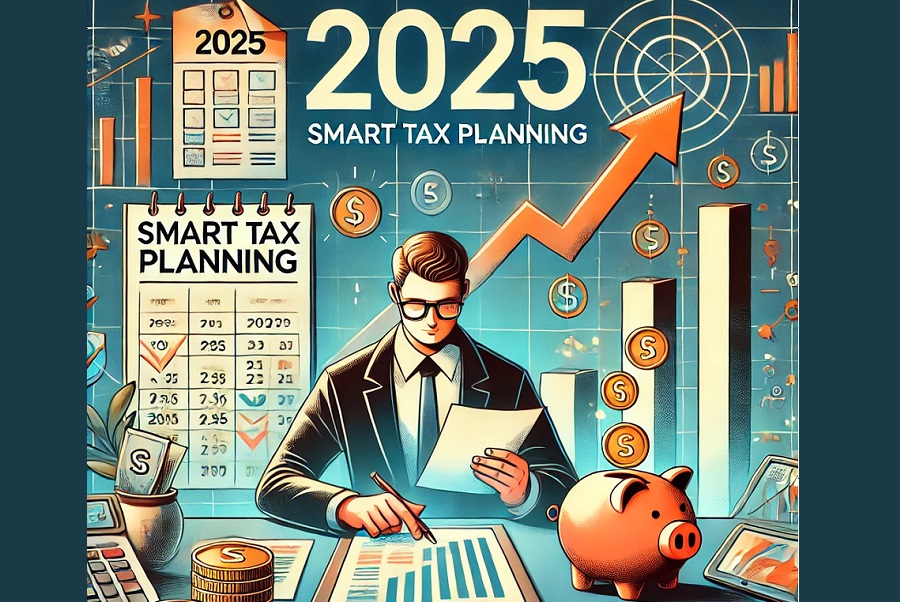Smart Tax Planning: Leveraging Budget 2025 Provisions to Build Wealth

The Union Budget 2025 brings a host of opportunities for taxpayers to optimize their finances and build long-term wealth. Smart tax planning, aligned with the latest provisions, not only reduces your tax liabilities but also enhances your financial health. Here’s a guide to leveraging the new budget provisions to your advantage.
Why Smart Tax Planning Matters
Tax planning is a crucial element of financial management. It enables you to:
- Reduce your tax burden legally.
- Align your financial goals with tax-saving opportunities.
- Invest in instruments that foster wealth creation.
The 2025 budget introduces several provisions aimed at supporting individual taxpayers, encouraging investments, and promoting sustainability. Understanding and utilizing these provisions can help you build a robust financial strategy.
Key Budget 2025 Provisions to Leverage
1. Enhanced Standard Deduction
The standard deduction for salaried individuals and pensioners has been increased to ?75,000. This provides immediate tax relief and leaves more disposable income for investment or savings.
2. Tax Incentives for Green Investments
To promote sustainability, the government has offered tax deductions on investments in green bonds and renewable energy projects. These eco-friendly options not only provide tax benefits but also align your portfolio with global ESG trends.
3. Higher Limits for Section 80C
The annual investment limit under Section 80C has been raised to ?2 lakh from ?1.5 lakh. Instruments like Public Provident Fund (PPF), Equity-Linked Savings Schemes (ELSS), and National Savings Certificate (NSC) become even more attractive with this increased ceiling.
4. Expansion of Affordable Housing Benefits
The interest deduction on home loans for affordable housing has been enhanced under Section 80EEA, encouraging first-time buyers to invest in real estate. This not only offers tax savings but also builds a tangible asset.
5. National Pension System (NPS) Boost
The additional deduction for NPS contributions under Section 80CCD(1B) has been increased to ?75,000, fostering retirement planning while reducing taxable income.
6. Tax Relief for Senior Citizens
For senior citizens, the exemption limit on income has been raised to ?4 lakh, reducing their tax burden and encouraging investment in safe, income-generating instruments like Senior Citizen Savings Schemes (SCSS).
Effective Strategies for Tax Planning in 2025
1. Maximize Section 80C and 80D Benefits
- Invest in ELSS for Higher Returns: ELSS funds offer market-linked returns and a lock-in period of just three years, making them a tax-efficient choice.
- Optimize Health Insurance Deductions: Premiums paid for health insurance under Section 80D are deductible. Cover your family, including senior citizen parents, for maximum benefit.
2. Use Capital Gains Tax Exemptions
- Reinvest long-term capital gains in residential property to avail exemptions under Section 54.
- Invest in Section 54EC bonds for safe and tax-efficient capital gains deferral.
3. Leverage Tax-Free Retirement Contributions
- Maximize contributions to PPF and NPS, which offer tax exemptions on both investments and returns.
4. Focus on Green and Sustainable Investments
Government-backed green bonds are not only tax-exempt but also contribute to building a sustainable future.
5. Claim Deductions for Preventive Health Check-Ups
Deduct up to ?5,000 within the Section 80D limit for health check-ups, ensuring your well-being while saving taxes.
Long-Term Wealth Creation Through Tax Planning
While tax savings are important, wealth creation should be the ultimate goal. Here’s how to use tax planning as a tool for long-term growth:
- Invest for Compounding: Tax-saving instruments like PPF and ELSS allow you to benefit from compounding over the long term.
- Diversify Your Portfolio: Allocate investments across tax-efficient instruments such as equity, debt, and alternative investments.
- Focus on Liquidity: Balance your tax-saving investments with options that offer liquidity for emergencies.
The Role of Technology in Tax Planning
With advancements in financial technology, taxpayers can now use tools like:
- Online Tax Calculators: Estimate liabilities and identify saving opportunities.
- Robo-Advisors: Receive automated advice for tax-efficient investing.
- Investment Apps: Simplify portfolio management and track tax-saving investments.




















